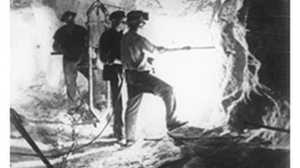Hermann Göring (1893-1946)

During World War I, Hermann Göring commanded the famous "Flying Circus" fighter squadron and became a highly decorated flying ace credited with shooting down 22 Allied aircraft. After the war, he met Adolf Hitler, joined the Nazi Party, and became a leader of the Sturmabteilung (Storm Troop), abbreviated SA. A member of the aristocracy, Göring used his social contacts to convince conservative industrialists that Nazism was the only way to save Germany from communism.
Addiction and Intrigues
In 1923 Göring took part in the Beer Hall Putsch, the Nazi Party's failed grab for power in Munich. He was seriously wounded and fled to Austria, Italy and then Sweden, where he was admitted to a mental hospital and then an asylum where he became a morphine addict. When general amnesty for the Putsch was declared in 1927, Göring returned to Germany, where he used his contacts with big business and army officers to smooth Hitler's road to power. In 1933 Göring became Minister of the Interior for Prussia, the largest German state, and controlled most of the police forces in Germany. In 1934 Göring gave control of the Gestapo, the German secret police, to Heinrich Himmler, as thanks for his assistance in the Night of the Long Knives coup that had eliminated Ernst Röhm, leader of the SA and Göring's arch rival. Göring and Himmler also worked together to set up early concentration camps for Jews and other Nazi opponents.
Lavish Lifestyle
In 1936 Hitler gave Göring control over the German economy. He created the state-owned Hermann Göring Works, which prepared Germany for war and created 700,000 jobs, but also lined his own pockets. Göring built a hunting mansion where he organized feasts and state hunts, and displayed art plundered from European museums. He changed uniforms and suits five times a day and flaunted his medals and jewelry. He remained genuinely popular with the German masses, who regarded him as more accessible than Hitler.
Holocaust Orders
After the Kristallnacht pogrom of November 9, 1938, orchestrated by his colleague Joseph Goebbels, Göring fined the Jewish community a billion marks and ordered the elimination of Jews from the German economy, the repossession of their property, and businesses, and their exclusion from schools, resorts, and parks. Three days later, he warned of a "final reckoning with the Jews." In 1941 he gave the order to "carry out all preparations with regard to ... a general solution of the Jewish question in those territories of Europe which are under German influence. ..." In recognition of Göring's accomplishments with the air force and the economy, Hitler designated Göring as his successor on September 1,1939.
War Criminal
Göring's glory was brief. His mishandling of the Luftwaffe on both the English and the Russian fronts underscored his incompetence as its commander. By 1943 Allied fighters had penetrated deeper and deeper into German territory and Göring had become discredited, isolated and despised by Hitler -- who blamed him for Germany's mounting defeats. He succumbed to his old morphine addiction and later fled Germany, only to be captured by the American Seventh Army at the end of the war. In 1946 he was put on trial at Nuremberg and found guilty of conspiracy to wage war, crimes against peace, war crimes, and crimes against humanity. He was sentenced to death by hanging. On October 15, 1946, two hours before his execution was due to take place, Göring committed suicide, taking a poison capsule he had concealed from the guards.







